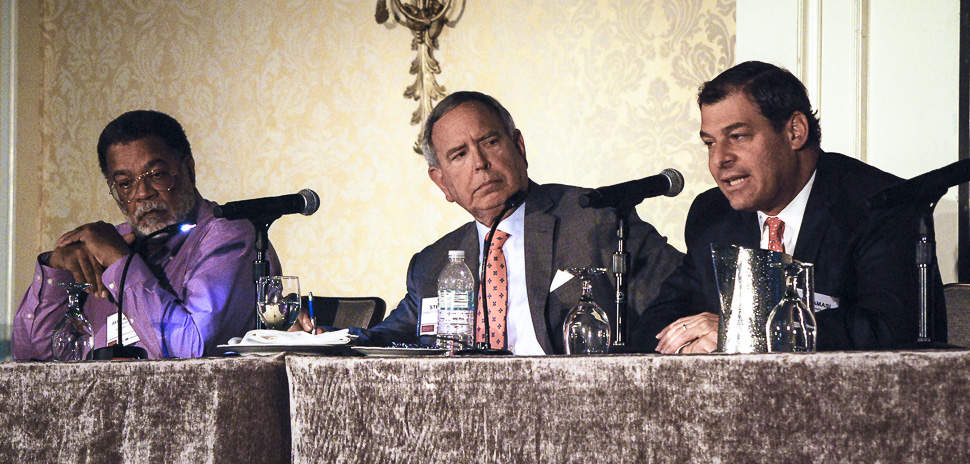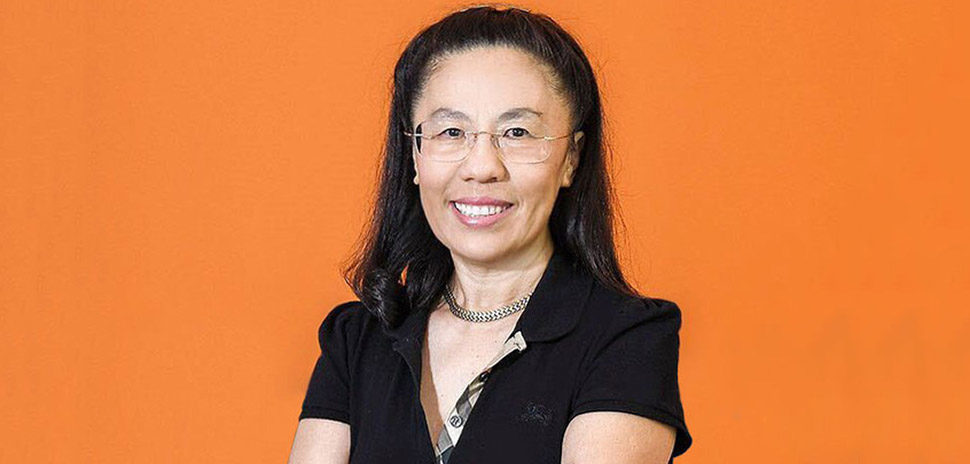Health-care opportunities and challenges took center stage this week at the Healthcare Dealmakers Conference at the Four Seasons Resort and Club at Las Colinas.
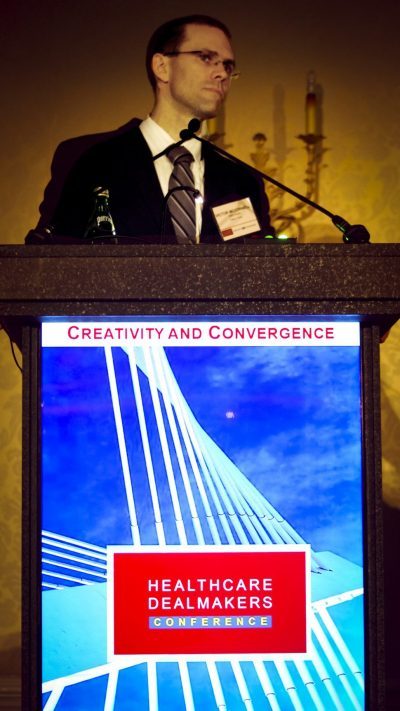
Health care real estate panel moderator, Victor McConnell [Photo: Lance Murray]
It was the 10th year for the Polsinelli law firm to hold the conference, a forum for health-care providers, their capital sources, and advisers to come together to discuss the current state and the future of deal-making in the health-care services arena.
Conference Chairman Bobby Guy, a shareholder at Polsinelli in Nashville, Tennessee, said the conference — with a theme of creativity and convergence —was a big success.
“It’s very interesting to watch the interaction between various different sectors and the financial investors that go with them, and to see the excitement.”
BOBBY GUY
“The conference has been very successful — between yesterday at the pitch competition, and then today, with the thought leadership around metropolitan hospitals and how they play into the health-care services across the market, and now looking at private equity, and all the ancillary services,” he said.
Guy said that conference speakers and panelists shared keen insights into what is happening in health care and the financial sector that backs it.
Speakers and panelists talked about everything from the pace of consolidation, new technologies, and legal issues facing the health-care industry, to how the new administration in Washington could affect mergers and acquisitions, health-care delivery, and reimbursement going forward.
Some companies are shedding services from their core businesses, while others continue to follow a natural transition in how they operate.
“There are a lot of people who think that what’s going on in health care is about disaggregating services from the hospitals, but what we’re hearing is that there’s a lot of opportunity in disaggregating services from the hospitals and for the hospitals in playing a part in everything that is happening,” Guy said. “It’s very interesting to watch the interaction between various different sectors and the financial investors that go with them, and to see the excitement.”
CONFERENCE BRINGS DALLAS NATIONAL ATTENTION
Guy said the conference brings national attention to Dallas because it attracts the cream of the crop in health care and financial services.
“We had a pitch competition, and we had people in from all over,” Guy said. “We had people from New York and from San Fransisco and LA, and here we are in Dallas, and everyone made comments about how strong the startup community was in Dallas — for startup and for the health-care venture scene.
“It was very pro Dallas, and everyone from all over the country heard it.”
“It was very pro Dallas, and everyone from all over the country heard it.”
BOBBY GUY
And, Guy said, the conference produced immediate opportunities for companies that pitched and the health-care providers and advisers who attended.
“One of my takeaways was from the pitch competition yesterday,” Guy said. “Mark Toney, who’s the current CEO of Brookdale Hospital in New York, said ‘This is amazing watching all of these companies coming up and present all of the technology that health-care services hospitals need, and if they’re looking to beta their product, send them to Brookdale.’”
Brookdale University Hospital Medical Center is one of the largest nonprofit voluntary teaching hospitals in Brooklyn, New York.
“He said ‘We have population — we don’t have money for the projects — but if they have venture backing or private equity backing, they can beta these products on our population.’ Safety-net hospitals would be very receptive to this. And, I thought this was a huge opportunity,” Guy told Dallas Innovates.
Guy took over the reins of the conference from Jon Henderson, Polsinelli shareholder in Dallas and chair of the firm’s corporate and transactional practice.
Henderson organized and steered the previous conferences.
He said that handing leadership of the conference to Guy has taken a load off his shoulders, but it was always the plan to eventually move on.
“This is the 10th year, and the vision about three years ago was not to do this forever, and then it was ‘how do you find the right successor?‘.”
JON HENDERSON
“This is the 10th year, and the vision about three years ago was not to do this forever, and then it was ‘how do you find the right successor?’” Henderson said. “We have a model in Polsinelli where we will rotate that title every two years.”
He said this year’s conference offered valuable information to attendees.
“Some of the greatness to it, is how we added the Reimbursement Institute this year,” Henderson said.
The Reimbursement Institute website is a resource for health-care providers to steer through the challenges that are associated with reimbursement by Medicare and Medicaid.
It is designed to inform providers about the latest developments in the reimbursement arena, offering the latest news and information about reimbursement-related topics.
“We always try to innovate in our conference and how we produce it, so this Reimbursement Institute was the new thing, and that adds a level of regulatory and legal depth to it that investors care about,” he said.
Henderson said one of the themes that resonated with him was the introduction of a new label: Modernism of health-care delivery.
Polsinelli has roughly 800 attorneys in 20 offices nationwide, serving corporations, institutions, and entrepreneurs. The firm’s attorneys provide legal counsel business insight, and focus on health care, financial services, real estate, intellectual property, mid-market corporate, labor and employment, and business litigation.
Here are some takeaways from several of the Healthcare Dealmakers panels:
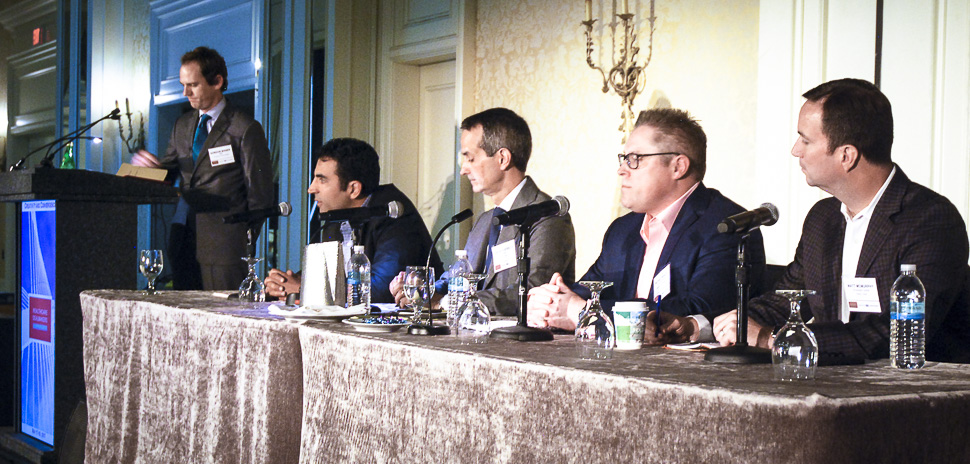
Justin Sabert-Peyman, Jon Henderson, Mike Healy, and Matt McMurphy discuss “Pervasive Themes in Growth Private Equity” [PHOTO: Lance Murray]
‘PERVASIVE THEMES IN GROWTH EQUITY’
Justin Sabet-Peyman, director, private equity for KKR in Menlo Park, California, talked about an investment his firm has made in a company that has developed a noninvasive treatment for insomnia.
“We see sleep as one of the core pillars of good health, along with diet and exercise.”
JUSTIN SABET-PEYMAN
“We see sleep as one of the core pillars of good health, along with diet and exercise,” Sabet-Peyman said. “We view this as an opportunity to back a company with an innovative product.”
Matt McMurphy, partner at Broadgate Capital in Dallas, talked about the home-health industry and how it often has to overcome bad publicity and misperceptions.
“A lot of what happens in the newspapers is that they don’t have as strong a lobby as, say, the AMA,” he said. “Most home-health operators may not be sophisticated, but they are in the business for the right reasons.”
McMurphy said, “It’s an industry that is so fragmented,” and that many of the businesses are “mom and pop” operators.
“They don’t think about the bottom line the way investors would,” he said.
Jon Henderson said there is a lot of interest in the urgent care and dental arenas, as well.
“There is an entrepreneurial push behind creating those companies.”
JON HENDERSON
He said of urgent care: “There is an entrepreneurial push behind creating those companies,” because they deliver care at the right place at the right time.
Dental companies and practices are active because they come with no Medicare or Medicaid reimbursement risk for investors.
McMurphy said that the nurse-practitioner model also has become popular in the industry because it cuts down on the costs related to care.
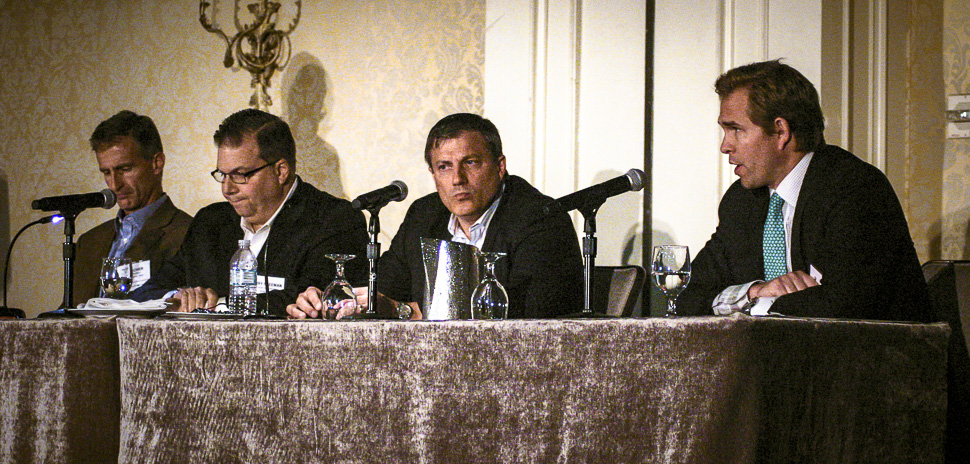
Timothy Schier, Barry Freeman, Chris Hendrickson and Mike Pisani on the panel, “Prophecy and Profit in Healthcare Services” [PHOTO: Lance Murray]
‘PROPHECY AND PROFIT IN HEALTHCARE SERVICES’
Moderator Mark Goran, a Polsinelli shareholder in St. Louis, Missouri said that in order for hospitals to remain competitive, they need capital, scale, expense reduction, and quality.
“Many or all of those are a byproduct or a benefit of consolidation,” he said. Markets that are experiencing more market-based pressures are consolidating faster, but markets such as Austin, Dallas, Houston where beds are continuing to be added, consolidation is happening more slowly.
“We will continue to see consolidation — [in] this market [Dallas] slower. It is happening, and we’ve seen over the past three or four years as smaller-share providers have gotten soaked up.”
“We will continue to see consolidation — [in Dallas] slower.”
MARK GORAN
Among the examples in Texas Goran cited was the merger of Baylor and Scott and White health systems in 2013.
Barry Freeman, managing director of Lincoln International in Chicago, Illinois, said that consumerism is a real trend in the health-care industry and that the out-patient care sector has been active.
“What we’re seeing across the landscape is an increase the consumerization of health care, and the proliferation of health-care providers that bridge that last mile, so to speak, between the provider and the home,” Freeman said.
New technologies allow care to move from the more traditional setting into a more retail setting closer to the home, providing convenience, he said.
“With the aging population and decreasing mobility that comes with age, these convenience attributes of multisite provider businesses and outpatient-based care is really fitting with where the consumer wants to be treated,” he said.
Mike Pisani, managing director at Houlihan Lokey in Dallas, said that outpatient therapy is one of the most active sectors in health care.
“It’s really exploded,” he said.
“It’s a very fun time to be in that sector.”
CHRIS HENDRICKSON
on outpatient therapy
Home health and post-acute treatment also are areas of growth and opportunity, said Chris Hendrickson, managing director of Ziegler in Minneapolis, Minnesota.
Deals are up 12 percent from 2005 in that sector, he said.
“It’s a very fun time to be in that sector,” Hendrickson said.
Timothy Schier, managing director of Cain Brothers in Houston, said that hospitals are more strategic with a focus on cost control.
They are reducing the number of senior management employees and strengthening their managed-care businesses, he said. Also, they are getting into the urgent care and freestanding emergency room space.
What disciplines are hospitals interested in expanding? Dermatology and ophthalmology.
Pisani said he’s aware of 22 sponsor-backed dermatology practices and that the investment pace in the field has gone from zero to 60 “very quickly.”
‘HEALTHCARE POLICY AND PAYMENT RECAP AS OF … TODAY’
What’s going on in Washington? That was the topic of the panel moderated by Steve Love, president/CEO of Dallas-Fort Worth Hospital Council, who led a spirited debate between Julius Hobson Jr., senior policy adviser at Polisinelli in Washington, D.C., and David Tamasi, managing director of Rasky Partners in Washington, D.C.
“These guys are in Washington, and they’re on top of this,” Love told attendees.
Then the fun started.
Hobson, a registered independent who lives in a place with only a closed primary system, so he doesn’t vote in primaries because he thinks “both parties suck.”
“These guys are in Washington, and they’re on top of this.”
STEVE LOVE
He addressed the American Health Care Act (the Obamacare replacement) which gets its Congressional Budget Office score next week, the release of President Trump’s budget next that may include up to $800 billion cuts to Medicaid, the appointment of a special counsel in to investigate the Russian interference with the U.S. election, the apparent demise of any possible infrastructure bill this year, and the slowing of push for tax reform.
“The problem I had with the Affordable Care Act is that it was passed with support from one side of the aisle,” Hobson said. “The problem I have with the American Health Care Act is the same thing — all on the Republican side.”
He said that when American gets the best of the legislative process it’s because it’s bipartisan, and we get the worst when it’s one-sided.
He said the health-care bill really is the first part of the tax bill be making cuts to Medicaid which make budget room for the tax bill.
Tamasi, a registered Republican in Washington, agreed with most of the points Hobson made.
“There’s been an interesting trajectory with things in Washington this week,” he said.
“There’s been an interesting trajectory with things in Washington this week.”
David Tamasi
He said he expects that Senate Republican leadership will move a bill out in July and that the House will deal with it before the August recess.
He said that the tax and infrastructure bills are moving forward, if only at the committee levels.
On Medicaid, Tamasi said, “That continues to be a sticking issue, it is really a regional issue with blue states and red states.”
He thinks there likely won’t be a conference committee on the health bill because Republicans will want to be able to campaign on it during the recess.
Love asked how the administration can create block grants when some states took advantage of Medicaid expansion under Obamacare and others did not.
“I think once we get through this Affordable Care Act legislative exercise and the political air is out of the balloon, then you get to the next phase, and that is the regulatory,” Tamasi. That, then, will make it possible for states to have conversations with the Health and Human Services Department to shape how they will formulate the block grants proposed in the current legislation.
Love then asked about how allowing the sale of health insurance across state lines, as proposed in the AHCA, would work.
“Never happen,” Hobson said. “Most of your [state] insurance commissioners are elected and you will see the states make it a 10th amendment issue, which is something they have, and they will fight it tooth and nail,”
Once insurance is sold across state lines, then, at some point, the federal regulatory process has to come into play, and state insurance commissioners who’t sit back and allow that, he said.

Moderator Victor McConnell, Shane Seitz, Connie Cagel, Darryl Freling, and Alex Gilbert discuss the state of health-care real estate. [Photo by Lance Murray]
Updated May 19. 2017, 8:43 p.m.
Read about last year’s conference
Healthcare Dealmakers Conference Melds Money, Medicine










